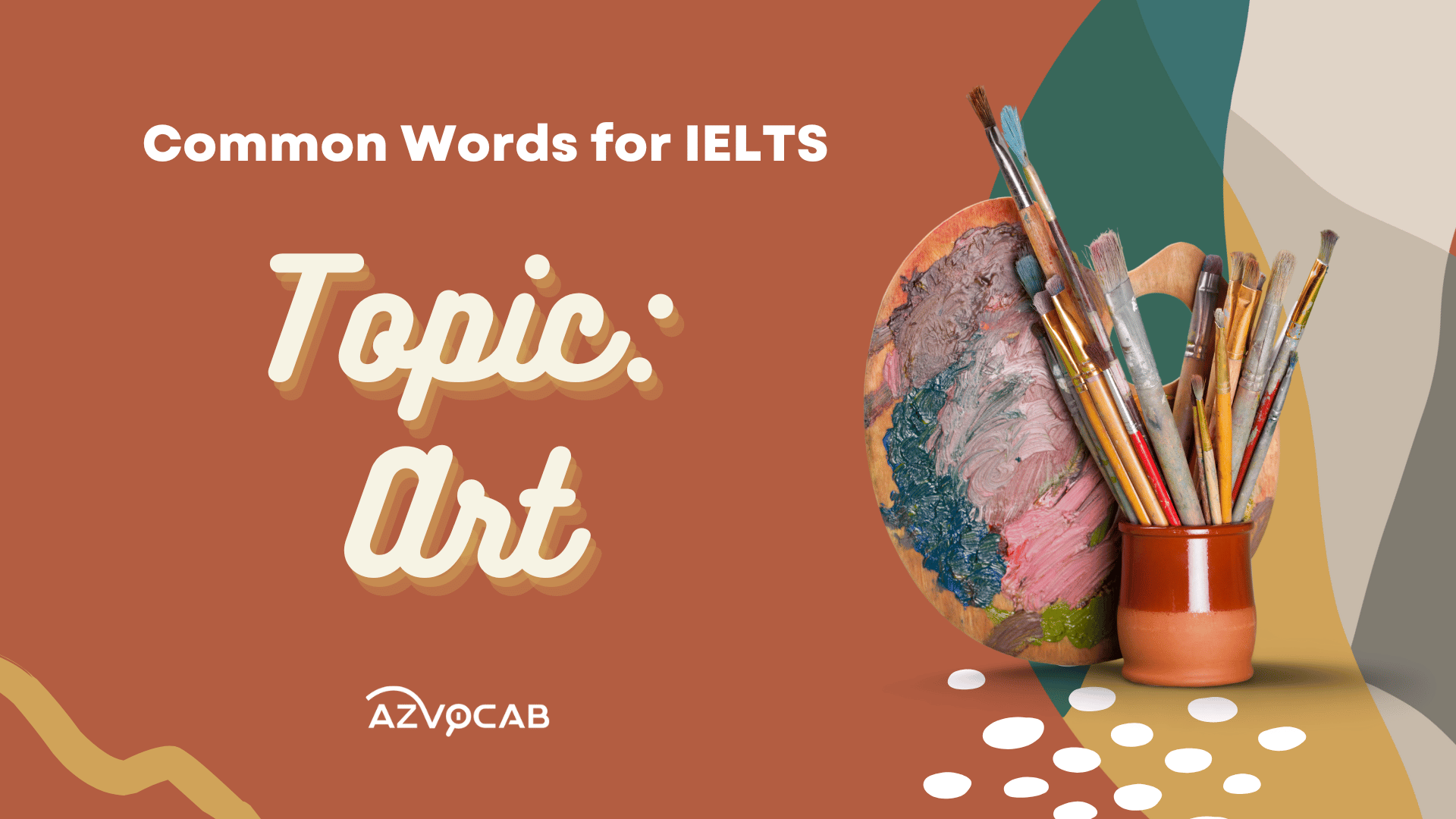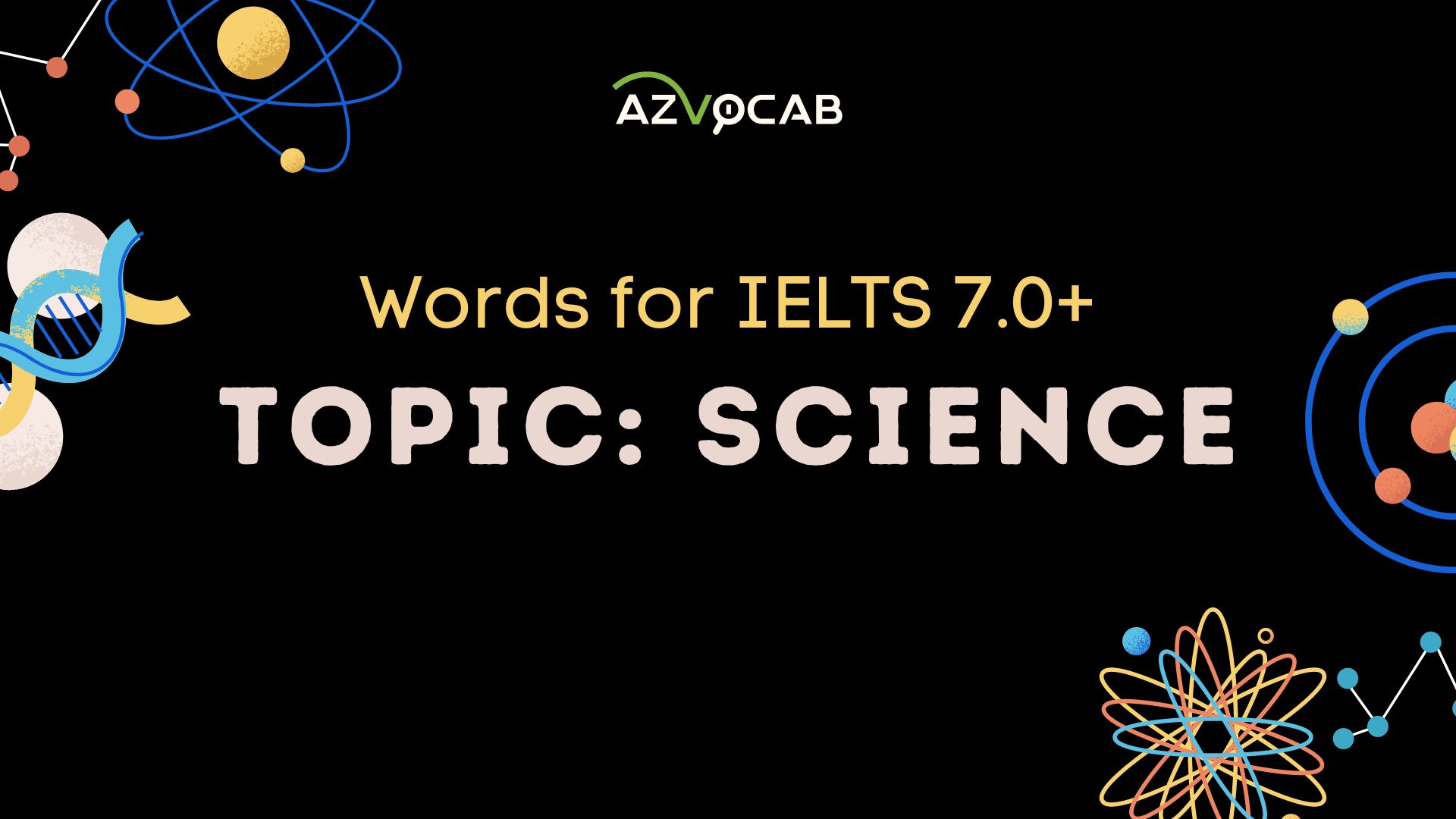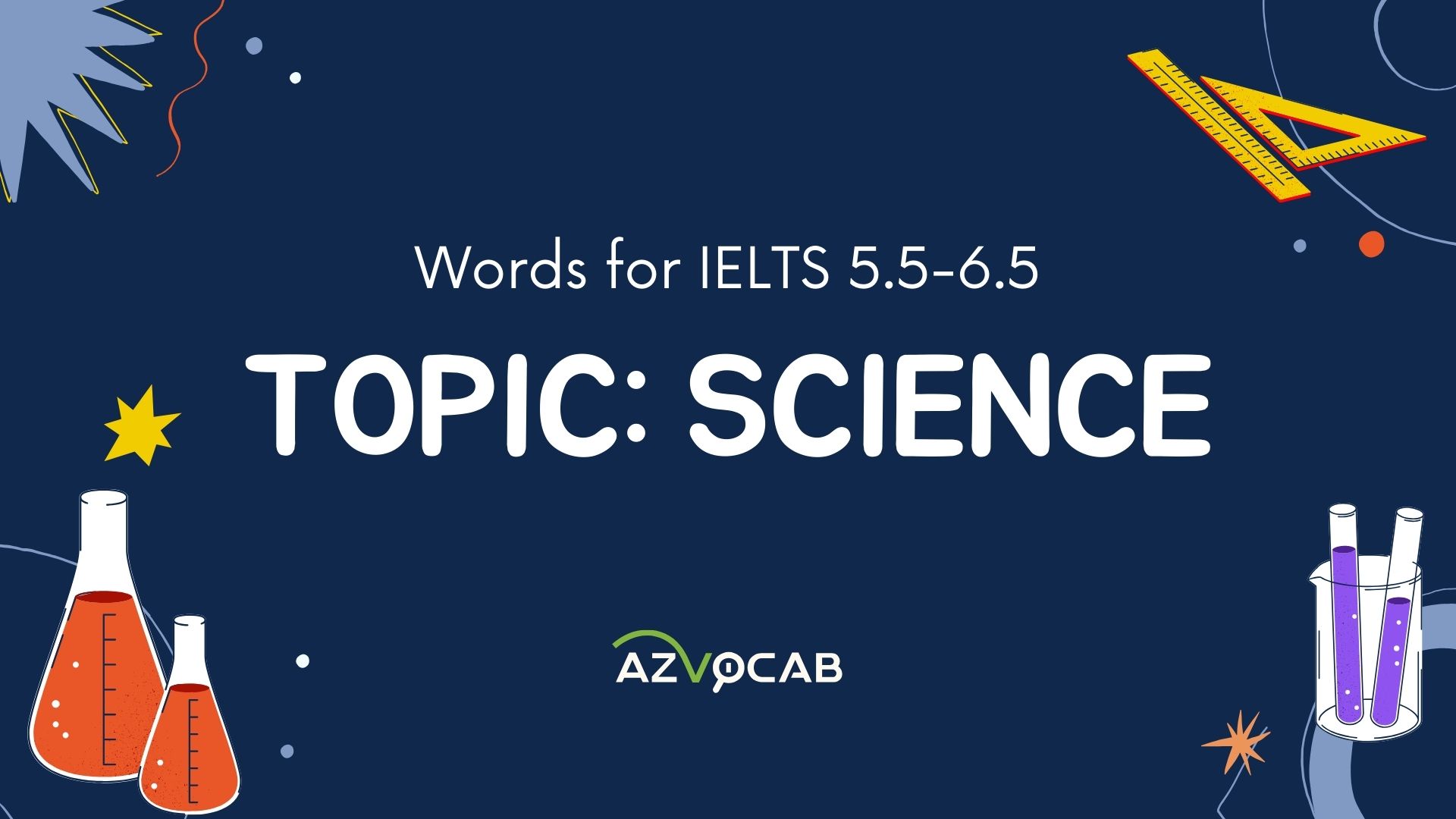azVocab has compiled over 70 of the most common words related to the topic of Art for the IELTS exam.
These vocabulary words can be used in four skills: Reading, Listening, Speaking, and Writing. The examples chosen by azVocab are carefully selected in specific contexts in IELTS exams. This will help you understand how to use words in context, increasing the effectiveness of your vocabulary learning.
1. Art Vocabulary by Characteristics
1.1. Vocabulary about types of art and artworks
| carving (n.) – a shape or pattern cut into wood or stone or the skill of doing this | You’ll be amazed at the intricate wooden carvings produced by local craftsmen. |
| concert (n.) – a performance of music by one or more musicians or singers | One of the stages will be devoted to showcasing musical theatre and the good news is that there will be plenty of free concerts for everyone to enjoy. |
| craft (n.) – skill and experience, especially in relation to making objects; a job or activity that needs skill and experience, or something produced using skill and experience | Children also love doing arts and crafts, so why not give them the task of making presents for upcoming birthdays or celebrations? |
| engraving (n.) – a picture printed onto paper from a piece of wood or metal into which the design has been cut | Paleolithic artists not only painted with pigments but also created engravings by scratching designs into rock with pointed tools, as well as creating low-relief sculptures. |
| image (n.) – a picture in your mind or an idea of how someone or something is | The research team was able to establish that the animals knew they were looking at their own image. |
| painting (n.) – a picture made using paint | The paintings there, begun by Piet Mondrian (1872 – 1944) in Europe and completed in New York, were scrutinized using the latest scientific techniques. |
| portrait (n.) – a painting, photograph, drawing, etc. of a person or, less commonly, of a group of people | In the Oscar Wilde novel The Picture of Dorian Gray, a man remains forever young while his painted portrait acquires the blemishes of his increasingly sinful life. |
| sculpture (n.) – the art of forming solid objects that represent a thing, person, idea, etc. out of a material such as wood, clay, metal, or stone, or an object made in this way | I don’t really appreciate classical music, I prefer the visual arts such as painting and sculpture. |
| the performing arts (n.) – forms of entertainment such as acting, dancing, and playing music | Season tickets to the theater are a perfect gift for someone who loves the performing arts. |
| depict (v.) – to represent or show something in a picture or story | The first, indebted to modernist architecture, depicted the home of tomorrow as a futuristic architectural structure. |
| theme (n.) – the main subject of a talk, book, film, etc. | As is the case each year, there will be a theme for the festival and this year it is Island life. |
| thread (n.) – the thread of a book, discussion, speech, etc. is its story or the way that it develops, one part connecting with another: | One of the main threads of the film is the development of the relationship between the boy and his uncle. |
| work (n.) – something created as a result of effort, especially a painting, book, or piece of music | Beethoven composed his greatest works in the latter part of his life. |
| archive (n.) – a collection of historical records relating to a place, organization, or family | Hence a good of the center is to create an archive of videotaped interviews with artists. |
| exhibition (n.) – an event at which objects such as paintings are shown to the public, a situation in which someone shows a particular skill or quality to the public, or the act of showing these things | This year, we have a special exhibition of work by amateur artists from our town. |
| gallery (n.) – a room or building that is used for showing works of art, sometimes so that they can be sold | In the main part of the museum, we have a gallery devoted to works by local artists, our sculpture collection, and a small collection of classical European art. |
1.2. Vocabulary about art-making tools
| artefact (n.) – an object that has been made by a person, such as a tool or a decoration, especially one that is of historical interest | I’ve always wanted to go on an archaeological dig to try to find fossils and ancient artefacts. |
| dye (n.) – a substance used to change the colour of something | Prehistoric people probably used plants like sumac and bedstraw as dyes because caches of those seeds have been recovered from archaeological sites although the plants have no known dietary use. |
| prop (n.) – an object used by the actors performing in a play or film | The set is minimal and the only props used in the show are a table, a chair, and a glass of water. |
1.3. Vocabulary about art styles and movements
| aesthetics (n.) – the formal study of the principles of art and beauty | For those of you who are interested in aesthetics, why not consider a visit to Bethania Island this year? |
| conception (n.) – an idea of what something or someone is like, or a basic understanding of a situation or a principle | In laboratories and galleries around the world, researchers are showing how the organisation of the brain relates to the conception and experience of art. |
| human nature (n.) – the natural ways of behaving that most people share | They’re also finding that, in some fundamental ways, art really is an expression of human nature. |
| reflection (n.) – the image of something in a mirror or on any reflective surface | Most likely your skin tingled, you felt a thrill and you paused for a moment of reflection. |
| stimulus (n.) – something that causes growth or activity | But the fact that aesthetic experience can inspire such a biological response suggests that it’s a stimulus neuroscientist could analyse just as deftly. |
| aesthetic (adj.) – relating to the enjoyment or study of beauty | The works of art are judged on purely aesthetic grounds. |
| artistic (adj.) – relating to art | Visitors to the festival will get the chance to discuss the creative process with the artists and there will also be opportunities to try out your own artistic skills at the workshops being held at various galleries on the island. |
| classical (adj.) – traditional in style or form, or based on methods developed over a long period of time, and considered to be of lasting value | Of the main classical styles found in Greece, Doric columns are the simplest and the capital at the top has two pieces. |
| eclectic (adj.) – methods, beliefs, ideas, etc. that are eclectic combine whatever seem the best or most useful things from many different areas or systems, rather than following a single system | My taste in music is quite eclectic and there isn’t really one style of music that I like. |
| fictional (adj.) – imaginary | The names of the characters are entirely fictional. |
| figurative (adj.) – (of a painting, drawing, etc.) representing something as it really looks, rather than in an abstract way | He is a figurative painter and an outspoken proponent of skill-based art. |
| imaginative (adj.) – new, original, and clever | The architects have made imaginative use of glass and transparent plastic. |
| literary (adj.) – relating to literature (= written artistic works, especially those with a high and lasting artistic value) | Throughout the week there will be talks by local and international writers and a chance to dine with them at the various literary lunches. |
| spine-chilling (adj.) – very frightening | Last week I saw a horror movie, and the special effects were so realistic it was really spine-chilling to watch. |
| subjective (adj.) – influenced by or based on personal beliefs or feelings, rather than based on facts | The judging of artistic works can be very subjective; we need to find a way to make it more specific. |
| thrilling (adj.) – extremely exciting | The book is a thrilling adventure story. |
| visual (adj.) – relating to seeing | Rock engravings from the Copper Age found all over Europe in remote, hidden locations, indicate the artwork of the period was more than mere visual images, researchers believe. |
| vivid (adj.) – very brightly coloured | The colours are vivid, which helps bring the game to life. |
| abysmal (adj.) – very bad | The play was supposed to be a tragedy, but the acting was so abysmal it made me want to laugh not cry! |
| dismal (adj.) – sad and without hope | Using only very dark, black-and-white images, the filmmaker painted a very dismal picture of the countryside. |
| innovate (v.) – to introduce changes and new ideas | In response, society must also innovate, to reduce the scope of defection and restore the balance. |
1.4. Vocabulary about artistic inspiration
| appreciation (n.) – the act of recognizing or understanding that something is valuable, important, or as described | I believe that it is vitally important, in terms of the education of people and the appreciation of culture, to keep these national institutions funded by governments. |
| emotion (n.) – a strong feeling such as love or anger, or strong feelings in general | Mimes use movements, gestures, and facial expressions to portray a character or an emotion or to tell a story-all without words. |
| expression (n.) – the act of saying what you think or showing how you feel using words or actions | Nevertheless, the complexity of human expression may have started off as simple stages in animal ‘thinking’ or problem-solving. |
| imagination (n.) – the ability to form pictures in the mind | A child may not differentiate between his imagination and the real world. |
| inspiration (n.) – someone or something that gives you ideas for doing something | It’s so hard to compose songs without any inspiration. That’s why I write about my experiences. |
| inspirational (adj.) – making you feel full of hope or encouraged | He gave an inspirational reading of his own poems. |
| inspired (adj.) – excellent, or resulting from inspiration | Architects in Germany built monuments, halls, and theaters inspired by classic Greek structures such as the Acropolis in Athens. |
| mundane (adj.) – very ordinary and therefore not interesting | Even glimpses of mundane objects such as the latest curvaceous kettle can inspire something similar. |
| passionate (adj.) – having very strong feelings or emotions | If you can make customers feel passionate about your brand, then they’ll always buy it, whether your products are common household staples or expensive luxury items. |
| relaxing (adj.) – making you feel relaxed | If I’m having a dinner party with friends, then I play music that is more relaxing. |
| imagine (v.) – to form or have a mental picture or idea of something | Imagine yourself in the Louvre in Paris, pushing through the throngs to behold the Mona Lisa’s enigmatic smile. |
| inspire (v.) – to make someone feel that they want to do something and can do it | I think that music helps to inspire me when I’m working, although my colleagues find it distracting so I tend to listen with headphones on. |
| provoke (v.) – to cause a reaction, especially a negative one | When people look at works of art, it provokes serious and careful thought. |
| revolve (v.) – to move or cause something to move around a central point or line | Take Galileo, for example, who said that the Earth revolves around the sun. He was punished by the authorities for his views. |
1.5. Vocabulary about artistic creativity
| artist (n.) – someone who paints, draws, or makes sculptures | To top it all off, there will be a display of crafts created by emerging artists. |
| creation (n.) – the act of creating something, or the thing that is created | We sent her a copy of the book in acknowledgment of her part in its creation. |
| creativity (n.) – the ability to produce or use original and unusual ideas | They give us a different perspective on things, and they also help us develop our creativity, no matter what field of specialty we pursue. |
| establishment (n.) – the process of starting or creating something, for example, an organization | The establishment of the Center for the Technical Study of Modern Art signals the transformation of modernism from the art of the now to art for the ages. |
| expertise (n.) – a high level of knowledge or skill | A specialist in the Bronze Age and Neolithic cultures of the Aegean and southeast Europe who has argued that fibre-making expertise was as revolutionary as the creation of equipment for working with stone and metal. |
| process (n.) – a series of actions that you take in order to achieve a result | Visitors to the festival will get the chance to discuss the creative process with the artists. |
| sculptor (n.) – someone who creates sculptures | It’s a lovely setting to stroll around and admire the skill of the sculptors who have carved their artwork out of both wood and stone. |
| technique (n.) – a way of doing an activity that needs skill | People still consider Chaplin a master of the miming technique, in particular, his tragicomic “little tramp” character, who so effectively portrays human frailty through physical comedy, also known as slapstick. |
| accomplished (adj.) – skilled | There are some very famous and accomplished painters in residence on the island and their work will be featured in a wonderful exhibition. |
| burgeoning (adj.) – developing quickly | Scientific interest in ancient textiles and other fibre objects is burgeoning. |
| creative (adj.) – producing or using original and unusual ideas | Cuisine, photography, painting and drawing are all courses where students learn how to do creative things. |
| talented (adj.) – with talent; able or skilful | If you then go back past the catering village, on the left is this year’s craft market. This is always a popular area of the festival, where you can admire the craftwork of our talented exhibitors. |
| typically (adv.) – in a way that shows all the characteristics that you would expect from the stated person, thing, or group | Among the fabric samples Oakes has analysed are carbonised scraps from Hopewell burial sites. which were typically earth mounds. |
| display (v.) – to arrange something or a collection of things so that it can be seen by the public | Art can then be displayed on the walls around the room as well as on a large central wall. |
| enrich (v.) – to improve the quality of something by adding something else | Music really enriches our lives – it can turn a boring, monotonous period of time into a magical experience, so I think it’s essential to have music and, in fact, all of the arts in your life. |
| exhibit (v.) – to show something publicly | There was an outcry when the gallery decided to exhibit the work of a convicted criminal. |
| strike (v.) – to hit or attack someone or something forcefully or violently | The lightning strikes and causes a great deal of damage to the house. |
| transcend (v.) – to go further, rise above, or be more important or better than something, especially a limit | This is the burgeoning field of neuroaesthetics, in which scientists are discovering that — rather than transcending the ordinary — art and aesthetics are part of everyday experience. |
2. Art vocabulary by band
azVocab has categorized Art vocabulary by IELTS bands to help you study according to your target. Below are Art vocabulary words divided into three bands: 4.0 – 5.0, 5.5 – 6.5, and 7.0+.
2.1. Art vocabulary by band 4.0 – 5.0
2.3. Art vocabulary by band 5.5 – 6.5
2.3. Art vocabulary by band 7.0+
To achieve a target score above 7.0, you need to use more advanced vocabulary. For the Art topic, azVocab has compiled nearly 30 vocabulary words at the 7.0+ band level, helping you use them flexibly in the IELTS exam.
>> Top 30 IELTS vocabulary for band 7.0+ of topic Art
I hope this compilation of common vocabulary for the Art topic will be a useful resource for you to acquire the necessary vocabulary to conquer the IELTS exam.






